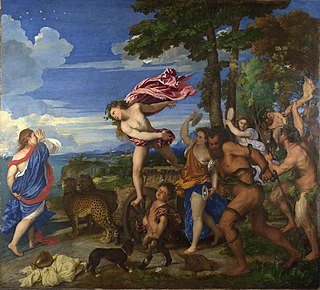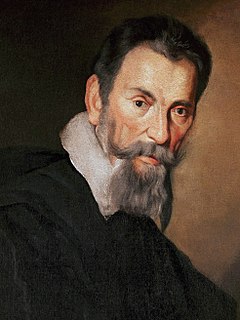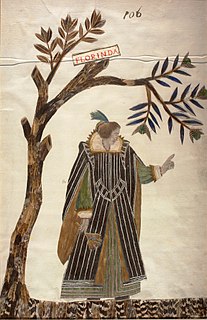Related Research Articles

Isabella d'Este was Marchioness of Mantua and one of the leading women of the Italian Renaissance as a major cultural and political figure. She was a patron of the arts as well as a leader of fashion, whose innovative style of dressing was copied by numerous women. The poet Ariosto labeled her as the "liberal and magnanimous Isabella", while author Matteo Bandello described her as having been "supreme among women". Diplomat Niccolò da Correggio went even further by hailing her as "The First Lady of the world".

Tomaso Giovanni Albinoni was an Italian composer of the Baroque era. His output includes operas, concertos, sonatas for one to six instruments, sinfonias, and solo cantatas. While famous in his day as an opera composer, he is known today for his instrumental music, especially his concertos. He is best remembered today for a work called "Adagio in G minor", attributed to him but largely written by Remo Giazotto, a 20th century musicologist and composer, who was a cataloger of the works of Albinoni.

Mantua is a city and comune in Lombardy, Italy, and capital of the province of the same name.

Salamone Rossi or Salomone Rossi was an Italian Jewish violinist and composer. He was a transitional figure between the late Italian Renaissance period and early Baroque.
In music, an intermezzo, in the most general sense, is a composition which fits between other musical or dramatic entities, such as acts of a play or movements of a larger musical work. In music history, the term has had several different usages, which fit into two general categories: the opera intermezzo and the instrumental intermezzo.

Eleonora Gonzaga, was born a Princess of Mantua as a member of the House of Gonzaga, and by marriage to Ferdinand II, Holy Roman Emperor, was Holy Roman Empress, German Queen, Queen of Hungary and Bohemia.

Italian opera is both the art of opera in Italy and opera in the Italian language. Opera was born in Italy around the year 1600 and Italian opera has continued to play a dominant role in the history of the form until the present day. Many famous operas in Italian were written by foreign composers, including Handel, Gluck and Mozart. Works by native Italian composers of the 19th and early 20th centuries, such as Rossini, Bellini, Donizetti, Verdi and Puccini, are amongst the most famous operas ever written and today are performed in opera houses across the world.

Margaret of Savoy was the last Habsburg Vicereine of Portugal from 1634 to 1640. In Portuguese she is known as Duquesa de Mântua, being by marriage the Duchess of Mantua and Montferrat. She was also regent of Montferrat during the minority of her daughter from 1612.
Settimia Caccini was a well-known Italian singer and composer during the 1600s, being one of the first women to have a successful career in music. Caccini was highly regarded for her artistic and technical work with music. She came from a family of well-known composers and singers, with her father being Giulio Caccini and her sister Francesca Caccini. Settimia Caccini was less well-known as a composer because she never published her own collection of works. Instead, nine works are attributed to her in two manuscripts of secular songs. Settimia was known much more for her talent as a singer, and she performed for nobility with the Caccini family consort and as a soloist. Coming from a musical family, she was able to lead herself to her own fame and success.

Adriana Basile was an Italian composer and singer.

L'Arianna is the lost second opera by Italian composer Claudio Monteverdi. One of the earliest operas in general, it was composed in 1607–1608 and first performed on 28 May 1608, as part of the musical festivities for a royal wedding at the court of Duke Vincenzo Gonzaga in Mantua. All the music is lost apart from the extended recitative known as "Lamento d'Arianna". The libretto, which survives complete, was written in eight scenes by Ottavio Rinuccini, who used Ovid's Heroides and other classical sources to relate the story of Ariadne's abandonment by Theseus on the island of Naxos and her subsequent elevation as bride to the god Bacchus.

Anna Gonzaga was an Italian French noblewoman and salonist. The youngest daughter of Charles Gonzaga, Duke of Mantua and Montferrat, and Catherine de Mayenne, Anna was "Princess Palatine" as the wife of Edward of the Palatinate, a grandson of King James I of England and uncle to King George I of Great Britain. She bore Edward three children, all daughters. Had Anna not converted Edward to Catholicism, the English throne might have passed to their descendants.

Charles II Gonzaga was the son of Charles I, Duke of Mantua, and Catherine de Lorraine-Guise. He was the Duke of Nevers and Rethel, together with his father.
Margarita Salicola was a famous opera singer of her time. She came from a family of musicians at the court of the Ferdinando Carlo Gonzaga, Duke of Mantua and became a staple of casts at San Giovanni Grisostomo, Venice's newest and most famous theater, in the 1680s. The earliest work with which she can be linked is Pietro Simone Agostini's Il ratto delle Sabine. She was especially praised for her appearance in the title role of Carlo Pallavicino's Penelope la casta in the winter of 1685. The Saxon elector Johann Georg III, in whose court Pallavicino already served, was so thrilled by her performance that he became intent to taking her and two castrati from the same cast into this service. After a staged "kidnapping," Salicola was escorted en route to Dresden by a Mantuan agent.

The Italian composer Claudio Monteverdi (1567–1643), in addition to a large output of church music and madrigals, wrote prolifically for the stage. His theatrical works were written between 1604 and 1643 and included operas, of which three—L'Orfeo (1607), Il ritorno d'Ulisse in patria (1640) and L'incoronazione di Poppea (1643)—have survived with their music and librettos intact. In the case of the other seven operas, the music has disappeared almost entirely, although some of the librettos exist. The loss of these works, written during a critical period of early opera history, has been much regretted by commentators and musicologists.

Virginia Ramponi-Andreini, also known by her stage name "La Florinda" was a celebrated Italian actress and singer. She was known for her performances in commedia dell'arte plays, many of them written for her by her husband Giambattista Andreini, and for having created the title role in Claudio Monteverdi's lost opera L'Arianna. She was born in Northern Italy in either Milan or Genoa. The exact date and place of her death are unknown.

Margherita Costa, singer, poet, playwright and feminist, is the most Baroque of the seventeenth-century Italian women writers and stands out for her original style and themes. As a poet, she employs a variety of genres, using humor and irony to criticize prevailing attitudes towards women and to mock the politics of her times. She is the first Italian woman writer to use humor and satire in her published works. Some of her poems are partially autobiographical for they include allusions to events in her life and complaints about her lack of fortune and literary recognition. Her poetry stresses the obstacles she faced as a woman and the difficult life of women in general. Costa was a prolific writer, publishing two books of prose, six volumes of poetry, three plays, two narrative poems and an allegorical pageantry, in verse, for knights on horseback..
The following is a timeline of the history of the city of Mantua in the Lombardy region of Italy.
Caterina Martinelli was an Italian opera singer, who was employed by Duke Vincenzo I of Mantua from 1603 until her death in 1608.
References
- ↑ Don Harran, "Madama Europa, Jewish singer in late Renaissance Mantua", in Festa musicologica: essays in honor of George J. Buelow ed. Thomas J. Mathiesen Benito V. Rivera, George J. Buelow, 1995 p197
- ↑ Emily Taitz, Sondra Henry & Cheryl Tallan, The JPS Guide to Jewish Women: 600 B.C.E.to 1900 C.E. , 2003
- ↑ Schwarz, Boris (1983). Great Masters of the Violin . New York: Simon and Schuster. pp. 35–36. ISBN 0-671-22598-7.
- ↑ Eduard Birnbaum, Judith Cohen, Jewish musicians at the court of the Mantuan dukes (1542-1628) (1978) "However, Newman points out that the name "Madama Europa" is listed already before 1600 among the salaried employees of the Mantuan court; he therefore assumes that Rossi's sister had already appeared as "Europa" in an earlier Intermezzo".
- ↑ Shlomo Simonsohn, History of the Jews in the Duchy of Mantua (1977)